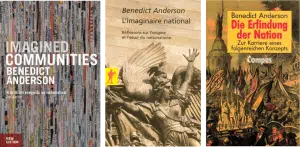Benedict Anderson most certainly did not think of football when he published his compact masterpiece Imagined Communities in the early 1980s. Yet I cannot think of another book that has been quoted or referred to as often by football researchers from all over Europe and beyond.
For me Imagined Communities certainly was a major eye-opener, and I remain grateful for the thought-provoking thesis the book develops. When I started to want to have a better understanding of why football does to us what it does, I felt I needed to learn as much as I could about the sociological and psychological mechanisms of nationalism. And when thanks to works like Imagined Communities I began to understand what nationalism does with us what it does and how difficult it is for 21st-century humans to emancipate from its emotional stronghold, I came to the conclusion that doing research on European integration from this angle was actually a stimulating perspective.
The book owns a lot to its incredibly catchy and precise title. Nationalism’s main strength lies precisely in the fact that it’s not an ‘imaginary’ – i.e. entirely unreal or made-up community – but an ‘imagined’ one : actively conjured up by the masses at regular intervals and passively taken for granted. Strangely enough, the concept, which made a fantastic career in academia, did not translate easily into French or German. ‘L’imaginaire national’ or ‘Die Erfindung der Nation’ do not have the same appeal, although they actually describe very pertinently what the book is about. I had first come across the French version, and although I had appreciated it a lot, soon bought the English original, too, and preferred, unsurprisingly, to quote the English title like everybody else.
Benedict Anderson has died, aged 79, in Indonesia. It seems very appropriate to me that his name and the title of his great book will be cited at a moment when nationalism is raising its head again even in regions of the world where it was supposed to be half-asleep, and when – simultaneously – the nations of the world are starting to find out that they better think beyond national borders in the fight against climate change and the ensuing ecological catastrophe. Imagine all the people imagining a global community, living life in peace. It isn’t hard to do, but if you want to understand why we’re still not there yet, I can recommend you some good reading.





